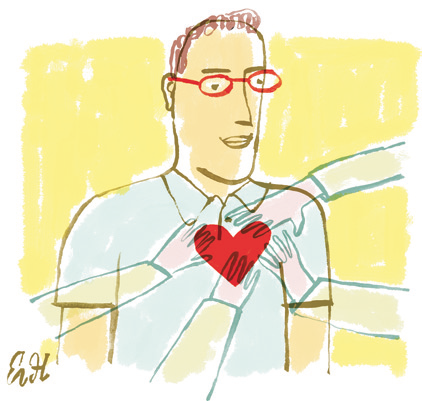BY JON LURIE
ON OCTOBER 27, 2010, my 11-year-old son, Malcolm, and I left home hauling a bucket of baseballs, a bat, two gloves, and a football. It was a blustery, unseasonably bitter night. Rather than bow to the inertia of a lazy autumn evening, I indulged Malcolm’s insistence that we work out at the Leonard Center—the first in a string of providential events that ultimately saved my life.
At age 42, after decades of devotion to sports and outdoor activities, it was now commonplace for me to squander my evenings on the couch, preferring rest over the gasping frustration that accompanied even a simple game of catch. My heart had been weakened over the previous 24 months by an autoimmune disorder called sarcoidosis—a rare disease for which there is no known cause or cure.
Sarcoidosis can affect any organ, but is most frequently found in the lungs. A general practitioner first discovered mine after I showed up at a St. Paul clinic complaining of chest congestion. Since then the illness had traveled into my heart and spine, causing dizziness, shortness of breath, fatigue, and occasional fainting spells. Even so, as Malcolm and I entered the Leonard Center, I couldn’t have predicted the near catastrophe about to ensue.
We paused at the door of the packed gym to shake off the cold and watch a varsity volleyball match. I recognized one of the players, Anna Trier ’13, a promising student in my creative writing course. I pointed out Anna to Malcolm as she bump-set an attack, and her teammate smashed the ball to the floor beyond the net.
Malcolm and I proceeded to the check-in desk, where I dug out my Mac ID and girded myself against a rapidly approaching dizzy spell. Swooning episodes, often accompanied by vertigo and numbness in my hands and ears, had recently become routine, usually lasting less than a minute before speeding off like a bullet train.
My knees buckled as if I’d been shot, and I knew this time it would not end well. Before hitting the floor I worried about leaving Malcolm, and sent off a quick prayer: Please God, I don’t want to die.
But I did die. I’d been struck by a condition known by the ominous but accurate name sudden cardiac death. I remember lying on my back, gulping deep, quick breaths of air, hearing my son cry, “Dad, what do you want me to do?” and being powerless to respond.
I heard the student worker, whose name I’ve never learned, leap from behind the desk and sprint off to find help. Then I felt a rushing sensation, like fast water pushing me away from my body. As an avid canoeist, this was a familiar feeling; I swam against the current, thinking only of staying with my body, and my boy.
Although I didn’t know it at the time, while I was fighting for my life, five Macalester employees—all of whom had remained in the building to watch the volleyball match—had rallied to my side. They were athletic director Kim Chandler, facility manager Soren Nelson, athletic trainer Randee Garberg, women’s basketball coach Ellen Thompson, and men’s basketball coach Tim Whittle.
This group, none of whom had any medical expertise beyond their work-mandated first-aid training, performed with the precision of veteran EMTs. Randee, Kim, and Soren performed CPR and applied the Automatic External Defibrillator (stored just steps from where I’d fallen). Within three minutes of collapsing, I’d returned to my body, and resumed living and—the most important role I have—being a father to Malcolm and my three adult daughters.
Several months later, Kim, Soren, and Randee were honored by the St. Paul fire chief, who presented them with certificates of commendation and medals issued by the governor for their lifesaving actions. I was exceptionally pleased to see my rescuers acknowledged for their bravery and competence.
When it was my turn to speak at the Leonard Center ceremony, I was overcome by emotion. I wept while attempting to tell the story of a night that would have been the end of me if not for an extraordinary convergence of people and medical equipment.
But as I stood before the Macalester community, local officials, and the media—a college English professor reduced to an inarticulate, teary mass—it was not recollections of mortal salvation that occupied my thoughts. It was the actions of basketball coaches Tim Whittle and Ellen Thompson, two heroes who were in attendance that day but did not receive certificates or medals.
As Kim and Soren were using the defibrillator, Tim and Ellen acted with the empathy of angels. They led Malcolm into a hallway, out of sight of me receiving a powerful jolt of electricity, and occupied him in tender conversation; reassuring my frightened son—when I was helpless to do so—that everything would be all right.
July 11 2012
Back to top




